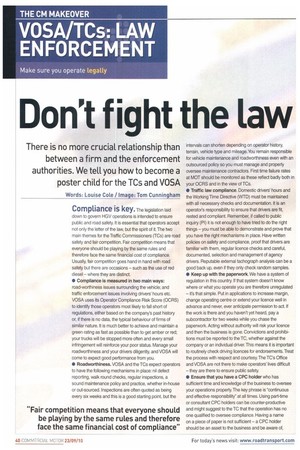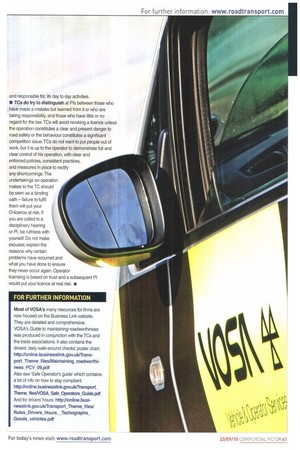Don't fight the Law
Page 40

Page 41

If you've noticed an error in this article please click here to report it so we can fix it.
There is no more crucial relationship than between a firm and the enforcement authorities. We tell you how to become a poster child for the TCs and VOSA
Words: Louise Cole / Image: Tom Cunningham CompLiance is key. The legislation laid down to govern HGV operations is intended to ensure public and road safety. It is essential that operators accept not only the letter of the law, but the spirit of it.The two main themes for the Traffic Commissioners (TCs) are road safety and fair competition. Fair competition means that everyone should be playing by the same rules and therefore face the same financial cost of compliance. Usually, fair competition goes hand in hand with road safety but there are occasions — such as the use of red diesel — where they are distinct.
• Compliance is measured in two main ways: road-worthiness issues surrounding the vehicle; and traffic enforcement issues involving drivers hours etc. VOSA uses its Operator Compliance Risk Score (OCAS) to identify those operators most likely to fall short of regulations. either based on the companys past history or. if there is no data, the typical behaviour of firms of similar nature, It is much better to achieve and maintain a green rating as fast as possible than to get amber or red; your trucks will be stopped more often and every small infringement will reinforce your poor status. Manage your roadworthiness and your drivers diligently, and VOSA will come to expect good performance from you.
• Roadworthiness. VOSA and the TCs expect operators to have the following mechanisms in place: nil defect reporting, walk round checks, regular inspections, a sound maintenance policy and practice, whether in-house or out-sourced. Inspections are often quoted as being every six weeks and this is a good starting point, but the intervals can shorten depending on operator history, terrain, vehicle type and mileage. You remain responsible for vehicle maintenance and roadworthiness even with an outsourced policy so you must manage and properly oversee maintenance contractors. First time failure rates at MOT should be monitored as these reflect badly both in your OCAS and in the view of TCs.
• Traffic law compliance. Domestic drivers' hours and the Working Time Directive (WTD) must be maintained with all necessary checks and documentation. It is an operator's responsibility to ensure that drivers are fit, rested and compliant. Remember, if called to public inquiry (PI) it is not enough to have tried to do the right things — you must be able to demonstrate and prove that you have the right mechanisms in place. Have written policres on safety and compliance, proof that drivers are familiar with them, regular licence checks and careful, documented, selection and management of agency drivers. Reputable external tachograph analysis can be a good back up, even if they only check random samples.
• Keep up with the paperwork. We have a system of regulation in this country. If that system doesn't know where or what you operate you are therefore unregulated — it's that simple. Put in applications to increase margin, change operating centre or extend your licence well in advance and never, ever anticipate permission to act. If the work is there and you haven't yet heard, pay a subcontractor for two weeks white you chase the paperwork. Acting without authority will risk your licence and then the business is gone. Convictions and prohibitions must be reported to the TC, whether against the company or an individual driver. This means it is important to routinely check driving licences for endorsements.Treat the process with respect and courtesy. The TC's Office and VOSA are not there to make operators' lives difficult — they are there to ensure public safety.
• Ensure that you have a CPC holder who has sufficient time and knowledge of the business to oversee your operations properly. The key phrase is "continuous and effective responsibility' at all times. Using part-time or consultant CPC holders can be counter-productive and might suggest to the TC that the operation has no one qualified to oversee compliance. Having a name on a piece of paper is not sufficient — a CPC holder should be an asset to the business and be aware of, and responsible for, its day to day activities.
• TCs do try to distinguish at Pls between those who have made a mistake but learned from it or who are taking responsibility, and those who have little or no regard for the law. TCs will avoid revoking a licence unless the operation constitutes a clear and present danger to road safety or the behaviour constitutes a significant competition issue. TCs do not want to put people out of work. but it is up to the operator to demonstrate full and clear control of his operation, with clear and enforced policies, consistent practices, and measures in place to rectify any shortcomings. The undertakings an operation makes to the TO should be seen as a binding oath — failure to fulfil them will put your 0-licence at risk. If you are called to a disciplinary hearing or Pl. be ruthless with yourself. Do not make excuses; explain the reasons why certain problems have occurred and what you have done to ensure they never occur again. Operator licensing is based on trust and a subsequent PI would put your licence at real risk. •
































































































































